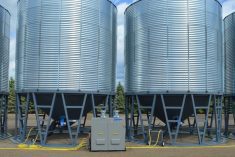Farmers can expect a rebate on carbon taxes paid on fuels used to dry grain, Jim Carr, the federal cabinet’s special representative for the Prairies, told the Canadian Crops Virtual Convention on Tuesday.
However, he didn’t provide any details.
“There is promising news on this front,” Carr told the meeting, hosted by the Canola Council of Canada and Canada Grains Council. “We know it has been an irritant. I understand why. I just want you to take some reassurance on what (Agriculture) Minister (Marie-Claude) Bibeau said last week and what will be discussed internally and then made public before too long about details on how we are going to address this issue.”
Read Also

Dryness poised to threaten Saskatchewan crops
Crops in Saskatchewan are developing in opposite directions, the province’s latest crop report said. Growing conditions in the province vary, with some areas receiving enough rain while other locations are experiencing crop stress due to hot, dry conditions.
A statement from Bibeau last week said, in part: “We are committed to new rebates for on-farm fuel use such as grain drying, in order to both support our food producers and also encourage new investments in sustainable technologies that go beyond existing exemptions for farm fuels and rebates for greenhouses.”
Her statement came in reaction to Bill C-206, a private member’s bill to exempt certain farm fuels from the carbon tax, which the governing Liberals voted against.
“In addition, our government will make grain drying and barn heating a priority focus under the new $165 million agriculture clean technology fund,” Bibeau said. “The program will invest in energy efficiency, fuel switching, and other new technologies on farms. This program will be announced in the coming months. These commitments build on our government’s impending launch of a $185 million Natural Climate Solutions for Agriculture Fund, which will also be announced in the months to come.”
Farmers are already fighting climate change and the federal government intends to help them achieve more, Carr said.
“The issue has gathered a lot of heat across the Prairies,” he added. “I don’t like some of that heat and I think we have to do something about it. What Minister Bibeau announced last week, and as that policy roles out over the coming weeks, I think that some of that heat will come out of the discussion.
“And I also believe that it’s important that the Government of Canada has a better insight into why there’s so much heat and why farmers have taken the position they have on a price on pollution and why they believe that there ought to be rebates and exemptions and that’s what we are determined to do so.”
Instead of carbon tax, the federal government prefers to call it a ‘price on pollution,’ Carr said.
“It’s a price mechanism that even conservative economists around the world think is the right way to go,” he said.
Carr declined to say if the carbon tax — set to hit $170 a tonne by 2030 — would result in lower emissions, or if it needs to be higher.
And while finding a consensus on cutting carbon emissions to mitigate climate has been difficult, Carr said consensus is getting closer.
“If you look at how the tone and temperature has been reduced over the last number of months….” he said.
“While consensus might be elusive, it is worth chasing. And I see all kinds of alignment between the government of Canada and the governments of Alberta, Saskatchewan and Manitoba.
“I am always looking for common ground and I am encouraged to see how much we’re finding.”
Carr also said the Port of Vancouver authority should have more Prairie directors on its board — a move for which the Western Grain Elevator Association is advocating.
Canola Council of Canada president Jim Emerson told Carr goods shipped from the Prairie provinces accounts for 85 per cent of the value of cargo shipped through Vancouver, but Prairie representatives make up just nine per cent of the port authority’s directors.
The Canadian government — including the public service as well as boards and commissions — needs more Prairie representation, Carr added.
— Allan Dawson is a reporter for the Manitoba Co-operator at Miami, Man.















